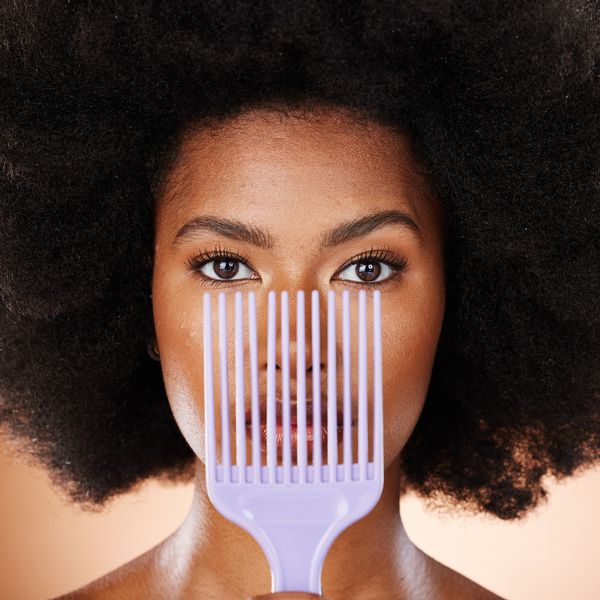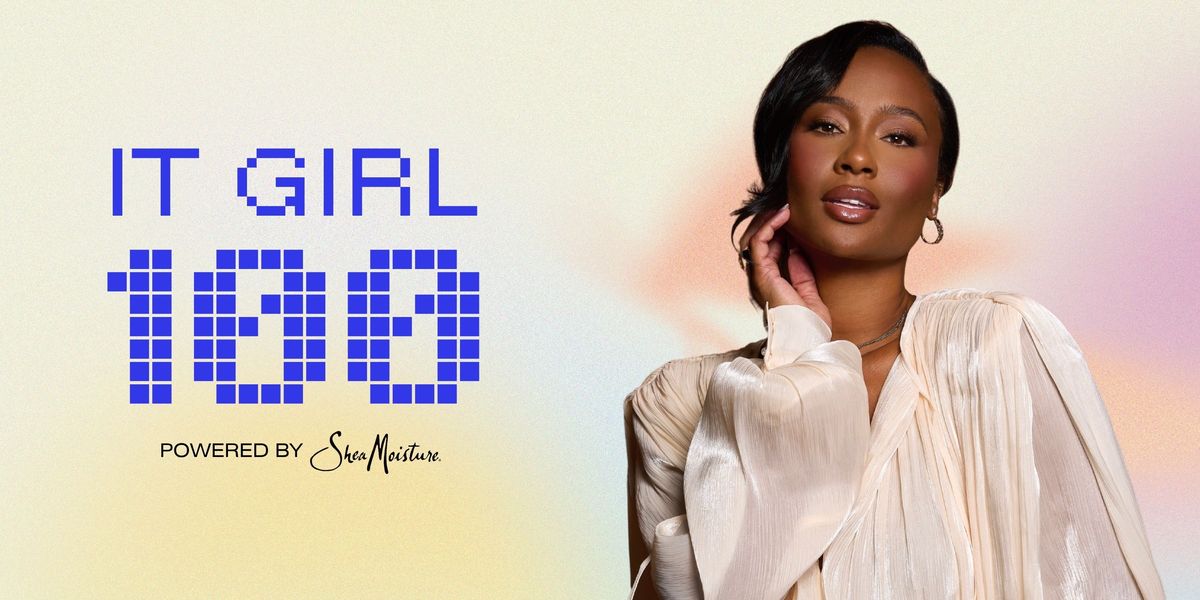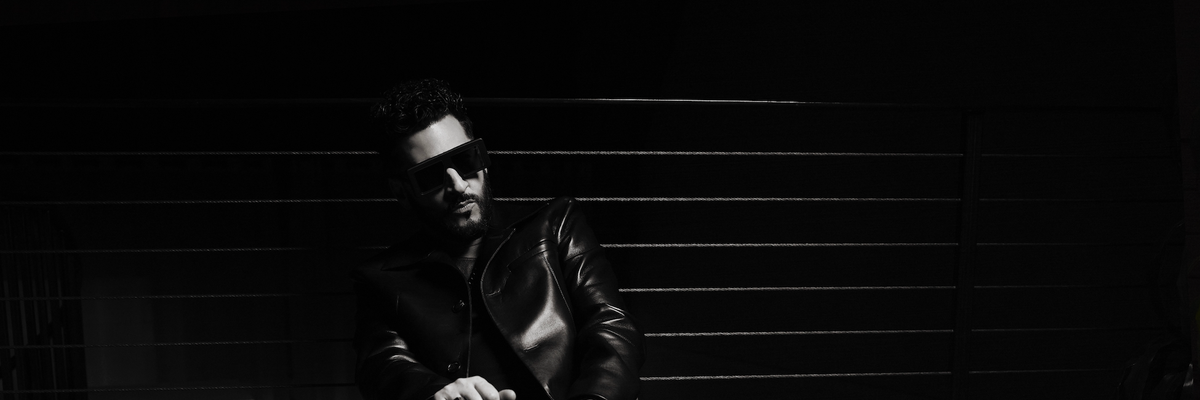
The fear of heat damage has been instilled in me since I went natural six years ago. Since then, I vowed to take my hair health seriously and put that above all else, unfortunately, straightening my hair didn’t seem to align. People will constantly tell me, “Don’t straighten your hair, it’ll mess up your curls.” I heard this so much that it made me nervous every time I had to do it.
However, I would also see other naturals wear their hair straight, only for it to revert right back to its tight curly pattern. It made me curious, and I started to ask different natural hair stylists whether the myth was true. They all responded, “You can, but not too much.”
In case you're like I was and are a little hesitant about applying heat to your hair out of fear of damage, I want to debunk a lot of the hair-straightening myths so you don’t have to be afraid to switch up your style every now and then. Here’s the truth about heat on natural hair and how to prevent damage.
Straightening Your Hair Isn’t Bad
Don’t listen to the naysayers, the only person you should listen to is your stylist. If you’re considering switching up your curly hairstyles for something sleekier, your stylist will guide you and give you tips on the best way to do that.
One of the benefits of natural hair is that it’s typically stronger and has high elasticity to fight breakage and damage. Plus, natural hair is versatile and not confined to just one style or look. In fact, my hairstylist, Aliya Abbey of Mane Mastery, says:
“One myth that I tend to see when it comes to natural hair is we need to stay away from all heat – blow drying and straightening. While some naturals prefer to avoid heat completely, it can actually work against you. Stretching the hair for trims gives more precision and a better look at the overall health of the strands, whereas curls can camouflage split ends and damage.”
There’s No Specific Rule Book
Generally, there are best practices for maintaining healthy hair, but truth be told, it’s not one size fits all. Hair texture, porosity, health, etc., all play a role in what you can do and how to do it. What may work for you may not work for others, and vice versa. Aliya continues, “Some hair strands can withstand more heat than others.”
It’s important to know your hair so you can create a routine and plan that works best for you.
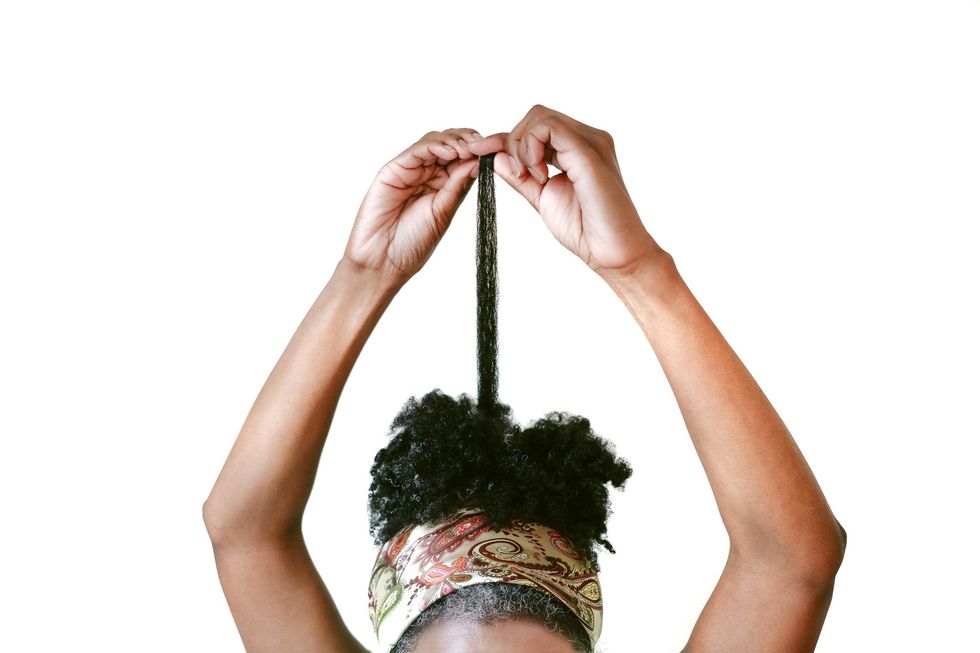
Grace Cary/Getty Images
Moderation and Minimization Are Key
As I mentioned before, too much of anything can be bad for you. When thinking of straightening your hair, protective styles, etc., it’s important to be aware of how often you're manipulating your hair. In general, a lot of naturals can’t keep our hands out of our hair, it kinda comes with the territory.
Implementing a low-manipulation routine can minimize breakage, create stronger hair strands, and promote hair growth. It’s not always what you do but how much you’re doing it. In terms of how often you should straighten your hair, Aliya adds that “straightening more than two times a month could cause weakness in the hair."
Use the Right Tools
I used to think all heat tools were the same. I've always based healthy straightening practices on technique. While that's true, the tools you use are just as important. The cheaper blow dryers and flat irons tend to overheat your hair or not straighten your hair well enough. When it comes to flat irons, it is best to get one where you can control the heat via temperature instead of high and low. This will allow you to see how much heat you're putting on your hair and have control.
On the other hand, if the blow dryer or flat iron isn't of quality, it will require you to pass through your strands more than necessary and possibly burn your hair. "Heat damage is caused by tools that are too hot, tools that are being passed by a section of hair too many times, and/or dehydrated hair. It's important to take note of the type of tools being used and the frequency of straightening. Don't forget to steam and hydrate!"
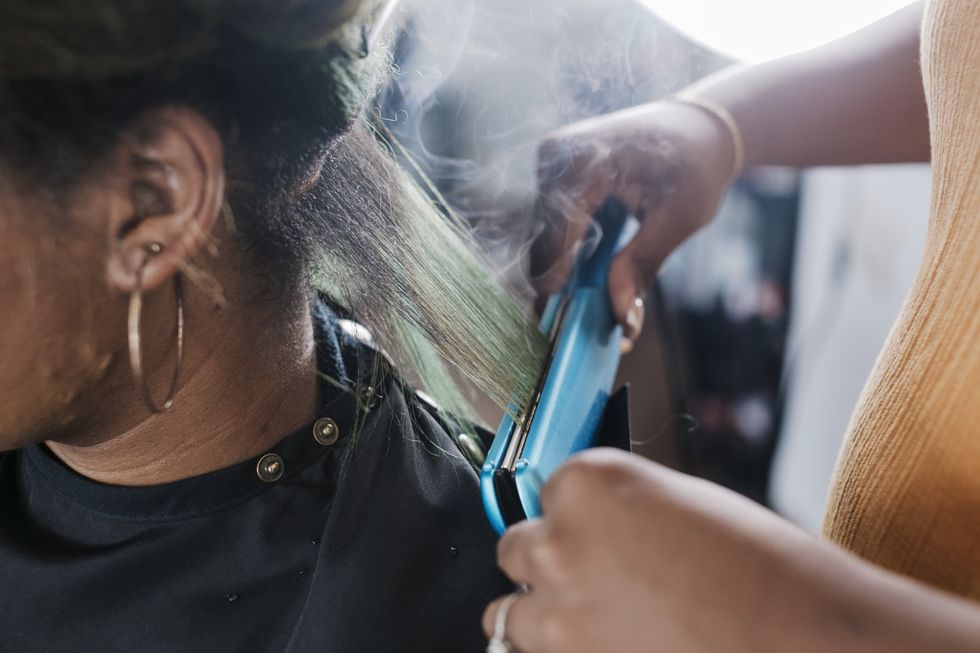
Willie B. Thomas/Getty Images
Heat Damage Is Preventable
One last fact about straightening natural hair is that heat damage is preventable, not inevitable. There are a few ways to avoid heat damage, one being steam and deep conditioning your hair. Doing this not only makes the strands more hydrated but also stronger.
Secondly, using a heat protectant is important. It creates a barrier between hair and heat exposure to protect your strands.
Lastly, have a professional do it. If you don't know what you're doing, get someone who does. Using the right care and technique can save you and your hair a lot of stress. Seeing a stylist who specializes in natural hair and silk presses can promote strong, healthy hair and avoid heat damage.
Don't be like me and let the unnecessary fear of heat deter you from your versatility. As long as you prioritize your hair health, you'll be okay. I follow the exact same routine with the help of my stylist, and my hair thickness, elasticity, and health have never been compromised.
Let’s make things inbox official! Sign up for the xoNecole newsletter for daily love, wellness, career, and exclusive content delivered straight to your inbox.
Featured image by Deagreez/Getty Images
- Everything You Need To Know About Perfecting An At-Home Blowout ›
- 8 Hair Masks & Deep Conditioners That Revitalize Dry, Damaged Hair ›
- Silk Press Season Is Underway & Here's What You Should Know About It ›
- I Tried Olaplex On My Natural Hair For 30 Days & Here's What Happened ›
- A 4-Step Process That Actually Prevents Heat Damage ›
- 6 Ways To Achieve A Straight Look On Natural Hair Without Heat Damage ›
Exclusive: Viral It Girl Kayla Nicole Is Reclaiming The Mic—And The Narrative
It’s nice to have a podcast when you’re constantly trending online. One week after setting timelines ablaze on Halloween, Kayla Nicole released an episode of her Dear Media pop culture podcast, The Pre-Game, where she took listeners behind the scenes of her viral costume.
The 34-year-old had been torn between dressing up as Beyoncé or Toni Braxton, she says in the episode. She couldn’t decide which version of Bey she’d be, though. Two days before the holiday, she locked in her choice, filming a short recreation of Braxton’s “He Wasn’t Man Enough for Me” music video that has since garnered nearly 6.5M views on TikTok.
Kayla Nicole says she wore a dress that was once worn by Braxton herself for the Halloween costume. “It’s not a secret Toni is more on the petite side. I’m obsessed with all 5’2” of her,” she tells xoNecole via email. “But I’m 5’10'' and not missing any meals, honey, so to my surprise, when I got the dress and it actually fit, I knew it was destiny.”
The episode was the perfect way for the multihyphenate to take control of her own narrative. By addressing the viral moment on her own platform, she was able to stir the conversation and keep the focus on her adoration for Braxton, an artist she says she grew up listening to and who still makes her most-played playlist every year. Elsewhere, she likely would’ve received questions about whether or not the costume was a subliminal aimed at her ex-boyfriend and his pop star fiancée. “I think that people will try to project their own narratives, right?” she said, hinting at this in the episode. “But, for me personally – I think it’s very important to say this in this moment – I’m not in the business of tearing other women down. I’m in the business of celebrating them.”
Kayla Nicole is among xoNecole’s It Girl 100 Class of 2025, powered by SheaMoisture, recognized in the Viral Voices category for her work in media and the trends she sets on our timelines, all while prioritizing her own mental and physical health. As she puts it: “Yes, I’m curating conversations on my podcast The Pre-Game, and cultivating community with my wellness brand Tribe Therepē.”
Despite being the frequent topic of conversation online, Kayla Nicole says she’s learning to take advantage of her growing social media platform without becoming consumed by it. “I refuse to let the internet consume me. It’s supposed to be a resource and tool for connection, so if it becomes anything beyond that I will log out,” she says.
On The Pre-Game, which launched earlier this year, she has positioned herself as listeners “homegirl.” “There’s definitely a delicate dance between being genuine and oversharing, and I’ve had to learn that the hard way. Now I share from a place of reflection, not reaction,” she says. “If it can help someone feel seen or less alone, I’ll talk about it within reason. But I’ve certainly learned to protect parts of my life that I cherish most. I share what serves connection but doesn’t cost me peace.
"I refuse to let the internet consume me. It’s supposed to be a resource and tool for connection, so if it becomes anything beyond that I will log out."

Credit: Malcolm Roberson
Throughout each episode, she sips a cocktail and addresses trending topics (even when they involve herself). It’s a platform the Pepperdine University alumnus has been preparing to have since she graduated with a degree in broadcast journalism, with a concentration in political science.
“I just knew I was going to end up on a local news network at the head anchor table, breaking high speed chases, and tossing it to the weather girl,” she says. Instead, she ended up working as an assistant at TMZ before covering sports as a freelance reporter. (She’s said she didn’t work for ESPN, despite previous reports saying otherwise.) The Pre-Game combines her love for pop culture and sports in a way that once felt inaccessible to her in traditional media.
She’s not just a podcaster, though. When she’s not behind the mic, taking acting classes or making her New York Fashion Week debut, Kayla Nicole is also busy elevating her wellness brand Tribe Therepē, where she shares her workouts and the workout equipment that helps her look chic while staying fit. She says the brand will add apparel to its line up in early 2026.
“Tribe Therepē has evolved into exactly what I have always envisioned. A community of women who care about being fit not just for the aesthetic, but for their mental and emotional well-being too. It’s grounded. It’s feminine. It’s strong,” she says. “And honestly, it's a reflection of where I am in my life right now. I feel so damn good - mentally, emotionally, and physically. And I am grateful to be in a space where I can pour that love and light back into the community that continues to pour into me.”
Tap into the full It Girl 100 Class of 2025 and meet all the women changing game this year and beyond. See the full list here.
Featured image by Malcolm Roberson
Jon B. Talks New Album, 18-Year Marriage & Being A Girl Dad
Since 1995, Jon B. has been entertaining us with his soulful voice, belting out R&B classics like “They Don’t Know” and “Someone to Love.” Despite his immense success, Jon decided to prioritize his family and take a step back from the music scene. He got married, and together, he and his wife had daughters. While he didn’t release any new music during this period, Jon remained dedicated to his fans by touring and maintaining his connection with them.
"I'm raising two daughters," he tells xoNecole exclusively. "One is 11 now, and one is 18, and both need their dad. Besides being a father, a rock star on the weekends, and a husband of 18 years, the real thing that kept me the busiest over the last 10 years was the road, keeping the bread on the table, and staying with my fans. Nevertheless, connecting with the fans and keeping that relationship alive. Regardless of whether I was on the radio every five minutes or whatnot. I just wanted to keep that relationship alive, and the best way to do that is just go and perform."
A decade later, Jon B. dropped a new album, WAITING on YOU. The album title alone is a nod to fans who have been waiting on him to release new music. The "Are You Still Down" singer collaborated with Rick Ross, Alex Isley, Tank, and Donell Jones on the album, giving fans a little bit of everything.
"Compiling this album was a labor of love because it was me sort of picking the gems. I wrote so many songs over the last 30 years. I wanted to go back and dust some old gems off and see if I can rework these records," he says. "Some of them are kind of reworks from back in the day, from back in the late '90s. I just kind of love the beat. One of the songs on my album is a vintage cut. I'll call it a vintage cut because I did it in '98. It's a song called "Pick Me Up."
"There's a little bit of the old and a little bit of the new, but WAITING on YOU, I felt was an appropriate name for the album, being that it was 10 years and it's really about my relationship that I have with my fans. Not only is it the relationship I have with my wife and my children, it's the extended relationship I have with with you guys, the listeners."
"There's a little bit of the old and a little bit of the new, but WAITING on YOU, I felt was an appropriate name for the album, being that it was 10 years and it's really about my relationship that I have with my fans."
His wife and kids are his biggest supporters and he shared that they sometimes give their opinion on his music. When it comes to his relationship with his wife, he says communication and patience are the keys to lasting. "I don't mean to sound like Dr. Phil up in here, but 18 years, going on 19, and it's like, I'm not counting, but I guess we're doing something right because we're very happy people," he says.
"I'm making music that reflects what I feel in my heart, which is pretty cool to share with the world now as a grown ass man instead of a guy who was growing up and had an old soul and I was figuring stuff out. I'm grateful for those records, but I really feel like these records are like a guy celebrating everything that I've been blessed to experience so far."
Let’s make things inbox official! Sign up for the xoNecole newsletter for love, wellness, career, and exclusive content delivered straight to your inbox.
Feature image courtesy






